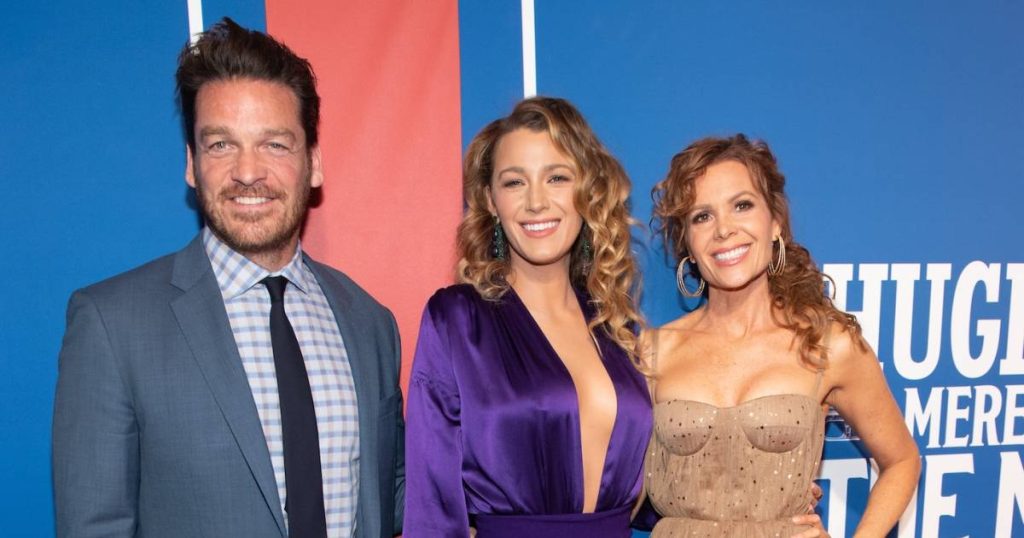Blake Lively, renowned actress and entrepreneur, found herself embroiled in a legal battle with her “It Ends With Us” co-star and director, Justin Baldoni, culminating in a lawsuit filed against him. Lively’s brother-in-law, Bart Johnson, stepped forward to defend her publicly, alleging that Baldoni orchestrated a smear campaign to tarnish Lively’s reputation. Johnson asserted that Lively’s complaints of sexual harassment were filed during filming, long before the public dispute, and that the cast unfollowed Baldoni for valid, albeit undisclosed, reasons. He characterized Baldoni’s public relations efforts as “gross and disgusting” yet effective, suggesting that the public had been manipulated into perceiving Lively negatively. Johnson emphasized that while mistakes might have been made, the public was only seeing a carefully curated narrative designed to damage Lively’s image.
Bart Johnson painted a picture of Blake Lively as a dedicated mother of four, married to a highly demanding spouse, Ryan Reynolds, while simultaneously managing multiple businesses, philanthropic endeavors, and her acting career. He described her as a “girl boss,” a woman thriving in traditionally male-dominated business spheres, juggling demanding responsibilities and long workdays while striving to be present for her children. Launching two new businesses amidst these challenges, according to Johnson, further compounded the pressure she faced, particularly while simultaneously dealing with the alleged PR campaign against her stemming from the sexual harassment claims. He argued that Lively’s efforts to promote the film amidst these circumstances, while maintaining a balanced public image, demonstrated her resilience and strength.
Johnson challenged the public’s swift judgment of Lively, emphasizing the difficulty of navigating public scrutiny while managing multiple demanding roles. He condemned the tendency to amplify negative moments while disregarding years of positive contributions, arguing that Lively’s alleged “rude” behavior in interviews was being disproportionately highlighted as part of the orchestrated campaign to discredit her. Johnson’s impassioned defense suggested a deep admiration for Lively’s resilience and a belief that the public was being misled by a calculated PR strategy. He pointed to the complexities of the situation, urging understanding and empathy for Lively’s position.
The details of Lively’s lawsuit, obtained by Us Weekly, alleged that Baldoni engaged in a deliberate “social manipulation” campaign to “destroy” her reputation. While Baldoni’s lawyer vehemently denied these accusations, claiming they were “completely false,” Robyn Lively, Blake’s sister and Johnson’s wife, publicly expressed her support for Blake, proclaiming “FINALLY justice for my sister.” This public display of solidarity from within the family further amplified the ongoing narrative of alleged wrongdoing on Baldoni’s part. The lawsuit and the subsequent public statements from family members transformed a behind-the-scenes dispute into a publicized legal battle, with conflicting narratives emerging from both sides.
Prior to the lawsuit, when fans noticed tension between Lively and Baldoni during the film’s promotion, with Baldoni conspicuously absent from interviews and press events, Johnson had already come to Lively’s defense. He responded to a fan’s criticism of Lively’s seemingly insensitive promotion of a film about domestic violence, asserting that the “truth has not come out yet” and highlighting Lively’s dedication to the film and its message. He reiterated his belief that the public was missing crucial context, and that Lively’s actions were being misinterpreted due to a lack of complete information. Even then, Johnson hinted at a larger, undisclosed story that would eventually vindicate Lively.
In his earlier defense of Lively, Johnson acknowledged the possibility of mistakes but stressed the intense scrutiny she faced under the public eye. He emphasized her commitment to the film’s message, suggesting that short clips and interviews didn’t capture the full picture of her intentions and contributions. His responses to online criticism highlighted his belief in Lively’s integrity and his conviction that the public narrative surrounding her was incomplete and misleading. Johnson’s repeated allusions to a hidden truth suggested a confidence that the full story, once revealed, would exonerate Lively and expose the alleged machinations against her. This consistent defense of Lively, both before and after the lawsuit, paints a picture of a family united in their support of her and their belief in her innocence.

